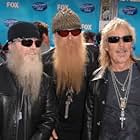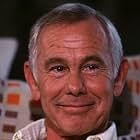The story of how three oddball teenage bluesmen became one of the biggest, most beloved bands on the planet.The story of how three oddball teenage bluesmen became one of the biggest, most beloved bands on the planet.The story of how three oddball teenage bluesmen became one of the biggest, most beloved bands on the planet.
- Awards
- 1 nomination
Photos
Billy Gibbons
- Self
- (as Billy F. Gibbons)
Robin Hood Brians
- Self - owner of Robin Hood Studios
- (as Robin Brians)
Josh Homme
- Self
- (as Joshua Homme)
'Country' Winston Marshall
- Self
- (as Winston Marshall)
James Brown
- Self
- (archive footage)
- (uncredited)
Johnny Carson
- Self
- (archive footage)
- (uncredited)
Roky Erickson
- Self
- (archive footage)
- (uncredited)
Mark J. Goodman
- Self
- (archive footage)
- (uncredited)
- Director
- Writers
- All cast & crew
- Production, box office & more at IMDbPro
Storyline
Did you know
- TriviaDave Wakefield played the cook. He comes from Ojai, CA, and played in the funk band Wonderbug in the 1990's. His drummer was legendary pop punk producer, the late Jerry Finn, who produced Blink 182, Sum 41, and Rancid.
- Quotes
Frank Beard: Clapton only snorted heroin, you know, which is like, so fucking... not cost-efficient!
[laughs]
Frank Beard: You have to do like, five times as much to get the same buzz! But he was making more money...
[laughs]
Frank Beard: But it's not cost-efficient.
- SoundtracksSharp Dressed Man
Performed by ZZ Top
Courtesy of Warner Bros. Records Inc.
By arrangement with Warner Music Group Film & TV Licensing
Featured review
The makers of this documentary have struck a fine balance between their various tools -- fuzzy historic stills and video clips of the band's earlier incarnations (Hill and Beard based in Dallas with Lady Wilde and the Warlocks; Gibbons with The Moving Sidewalks down in Houston), brief animations of key early moments (especially those involving their late manager Bill Ham), very short concert clips in their early prime, and memorable footage from their first music videos directed by Tim Newman for MTV in the early Eighties.
There are also testimonials from fans such as Billy Bob Thornton, Steve Miller, Josh Homme of Queens of the Stone Age, Dan Auerbach of The Black Keys, and others.
But the strongest two elements are the interviews with the individual members throughout -- recalling their origins, early choices, war stories (the best involve opening for Hendrix, the Rolling Stones in Hawaii, an early Memphis Blues Festival, Beard's dissection of his substance abuse problems in the late Seventies) -- and footage of the band "today" (that is, 2018) playing some favorite, signature tunes at historic Gruene Hall expressly for this film as they closed in on an astonishing 50 years as a working unit with no personnel changes.
What comes across clearly -- especially if, like me, you were not a rabid fan and follower of this band's career -- is that there was more to ZZ Top than met the eye. Though they had a distinct and unmistakable sound (a brand, if you will), this band also were both smart and lucky enough to hire very good people to handle their promotion, sound production, video work -- everything that was ancillary to the actual music, but crucial to helping it find the massive audience it eventually did.
That, and the fact that the band managed to absorb interesting currents from the larger music industry as it evolved, such as disco and punk, and were sharp enough to plunge immediately into MTV to promote their work.
The ZZ Top "mystique" was largely cultivated by their manager. They would have liked to appear on Johnny Carson and do interviews, but Ham nixed all of that. Do your music, and make everybody come to you, he said. (Other than Beard's brief mentions of leaving Dallas with a wife and a kid, and destroying a relationship with his substance abuse, there isn't a whiff of a mention of their personal lives otherwise. You get no idea whether Gibbons or Hill ever married or have any children.)
The story pretty much ends with 1983's _Eliminator_ album and the "Gimme All Your Lovin'" and "Legs" videos. That's all that's essential to tell the story of the band's origins and success; the rest is disposed of in two sentences on a black screen.
But the movie goes on to finish with a live performance of "Blue Jean Blues" (going all the way back to 1975), intercut with each of the band members talking about why they think they stuck together so long. It's nicely done.
There are also testimonials from fans such as Billy Bob Thornton, Steve Miller, Josh Homme of Queens of the Stone Age, Dan Auerbach of The Black Keys, and others.
But the strongest two elements are the interviews with the individual members throughout -- recalling their origins, early choices, war stories (the best involve opening for Hendrix, the Rolling Stones in Hawaii, an early Memphis Blues Festival, Beard's dissection of his substance abuse problems in the late Seventies) -- and footage of the band "today" (that is, 2018) playing some favorite, signature tunes at historic Gruene Hall expressly for this film as they closed in on an astonishing 50 years as a working unit with no personnel changes.
What comes across clearly -- especially if, like me, you were not a rabid fan and follower of this band's career -- is that there was more to ZZ Top than met the eye. Though they had a distinct and unmistakable sound (a brand, if you will), this band also were both smart and lucky enough to hire very good people to handle their promotion, sound production, video work -- everything that was ancillary to the actual music, but crucial to helping it find the massive audience it eventually did.
That, and the fact that the band managed to absorb interesting currents from the larger music industry as it evolved, such as disco and punk, and were sharp enough to plunge immediately into MTV to promote their work.
The ZZ Top "mystique" was largely cultivated by their manager. They would have liked to appear on Johnny Carson and do interviews, but Ham nixed all of that. Do your music, and make everybody come to you, he said. (Other than Beard's brief mentions of leaving Dallas with a wife and a kid, and destroying a relationship with his substance abuse, there isn't a whiff of a mention of their personal lives otherwise. You get no idea whether Gibbons or Hill ever married or have any children.)
The story pretty much ends with 1983's _Eliminator_ album and the "Gimme All Your Lovin'" and "Legs" videos. That's all that's essential to tell the story of the band's origins and success; the rest is disposed of in two sentences on a black screen.
But the movie goes on to finish with a live performance of "Blue Jean Blues" (going all the way back to 1975), intercut with each of the band members talking about why they think they stuck together so long. It's nicely done.
- How long is ZZ Top: That Little Ol' Band from Texas?Powered by Alexa
Details
- Release date
- Countries of origin
- Official site
- Language
- Also known as
- ZZ Top: Старая добрая группа из Техаса
- Filming locations
- Production companies
- See more company credits at IMDbPro
Box office
- Gross US & Canada
- $14,879
- Gross worldwide
- $14,879
- Runtime1 hour 31 minutes
- Color
- Aspect ratio
- 1.78 : 1
Contribute to this page
Suggest an edit or add missing content

Top Gap
By what name was ZZ Top: That Little Ol' Band from Texas (2019) officially released in Canada in English?
Answer

















